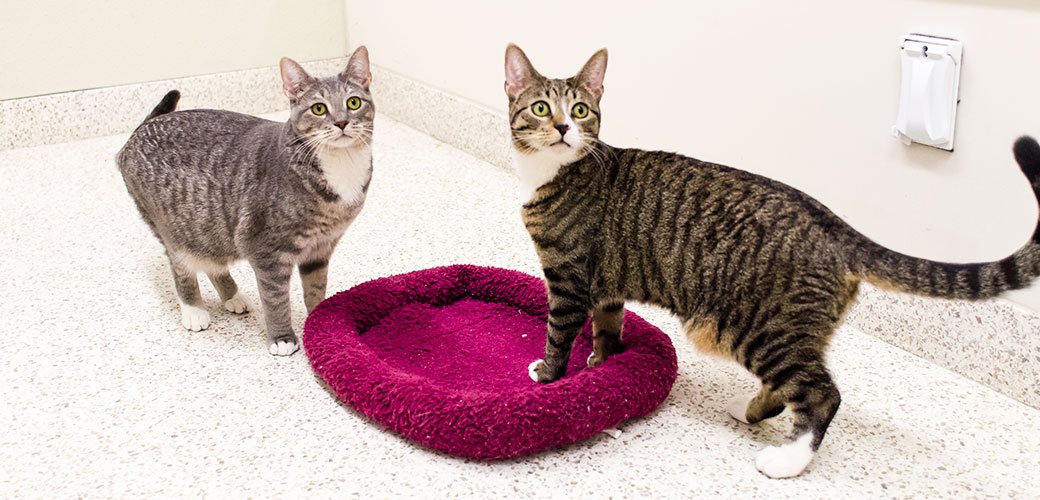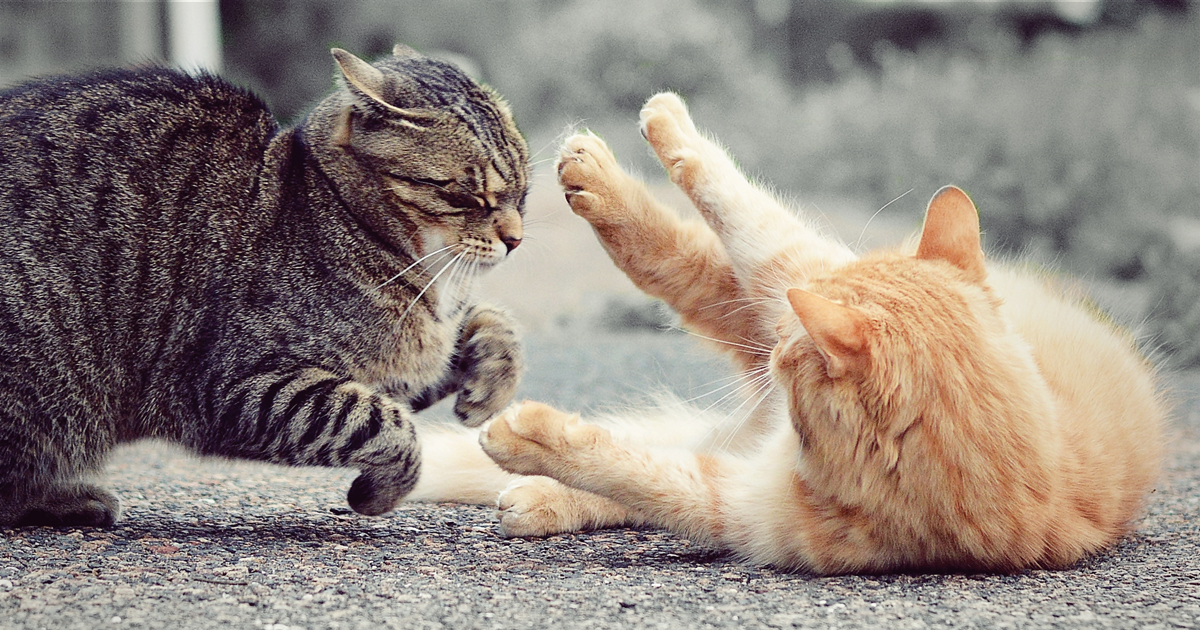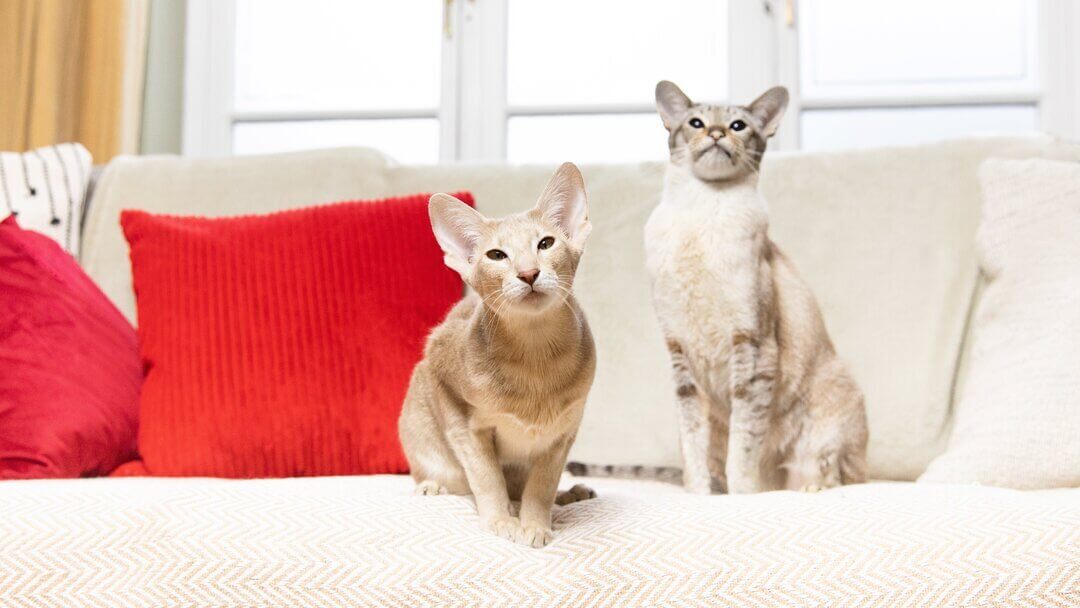How to Stop House Cats from Fighting: Peaceful Paws Guide

How to Stop House Cats from Fighting: Cats can be wonderful companions, but they sometimes fight. This behavior can be stressful for both cats and their owners.
Understanding why cats fight is key to stopping it. Many factors can lead to conflicts between house cats. Stress, territory issues, and lack of resources are common triggers. Owners may feel helpless when they see their beloved pets in a struggle.
Fortunately, there are effective strategies to reduce these fights. With patience and the right approach, you can create a peaceful home for your furry friends. This guide will help you identify the signs of fighting and suggest ways to prevent it. Let’s explore the best methods to ensure harmony among your cats.

Credit: www.battersea.org.uk
Introduction To Feline Aggression
Feline aggression can be confusing for cat owners. Knowing the common triggers helps prevent fights. Cats may fight over territory. They also fight for food or toys. Changes in the home can upset them.
Signs of conflict include loud hissing or growling. Watch for stiff bodies or raised fur. Cats may stare or swat at each other. These signs show they feel threatened or scared.
Understanding these triggers helps you manage your cats. Keeping a calm home reduces stress. Providing enough space also helps. Make sure each cat has its own safe area.

Credit: www.pdsa.org.uk
Identifying The Root Causes
Territorial behavior is common in house cats. Cats see their home as their space. They protect it fiercely. This can lead to fights between them.
Another reason for fights is competition for resources. Cats want the best spots to eat, sleep, and play. When one cat feels threatened, it may attack. Keeping resources like food and toys separate can help.
Understanding these behaviors helps reduce fights. Make sure each cat feels secure. Provide enough space for them. This can create a peaceful home.
Creating A Harmonious Environment
Each cat needs its own space. Cats can be very territorial. They may fight over areas they feel are theirs. To help, create separate areas for each cat. Use cat trees, beds, and litter boxes. This gives them their own spots to relax.
Enrichment is important for a happy cat. Keep them busy with toys. Use scratching posts to satisfy their natural instincts. Rotate toys to keep their interest alive. Playtime helps reduce stress and makes them feel secure.
Consider using feliway diffusers. These products release calming scents. They can help reduce tension. Always monitor your cats’ interactions. This way, you can catch any problems early.

Credit: www.purina.co.uk
Behavioral Interventions
Positive reinforcement is a great way to help cats behave. Rewarding good behavior makes them feel happy. Use treats or praise when they play nicely.
Introducing cats properly is very important. Start with a separate space for each cat. Let them smell each other through a closed door. This helps them get used to the new scent.
After a few days, let them see each other. Use a baby gate or a crate. Keep the meetings short and positive. Always reward them for calm behavior.
Slowly increase their time together. Watch for signs of stress. If they fight, separate them again. Take your time. Building a good relationship takes patience.
Health Check: Addressing Medical Issues
Pain-related aggression is common in cats. They may fight if they feel pain. This pain can come from injuries or illnesses. It is important to identify the cause of their discomfort.
Consulting a veterinarian is key. They can check for injuries, dental issues, or other health problems. A simple check-up can help find the right treatment. Always trust your vet’s advice.
Regular vet visits are important for your cat’s health. Early detection of issues can prevent fights. Healthy cats are happier and less aggressive.
Managing Resources
To stop house cats from fighting, manage their resources well. Separate feeding areas help reduce tension. Place food bowls in different rooms. This way, cats can eat without stress.
Also, provide enough litter boxes. A good rule is one box for each cat. This means two cats need three litter boxes. Clean the boxes regularly. A clean box makes cats happy.
Stress Reduction Tactics
Using pheromones can help calm fighting cats. These scents mimic natural chemicals. They make cats feel safe and relaxed. Pheromone diffusers are easy to use. Place them in shared areas.
Creating safe spaces is also important. Each cat should have its own area. This gives them a place to escape. Use separate rooms or cozy spots. Provide food, water, and toys in each space. This helps reduce stress.
Both techniques can work together. Pheromones create a calm atmosphere. Safe spaces give cats their own territory. Together, they help prevent fights.
When To Seek Professional Help
Sometimes, cats fight a lot. This can be scary for owners. Knowing when to get help is important. Behaviorists help understand cat behavior. They can show ways to reduce fights.
Signs you need help:
- Fights happen often.
- Cats hurt each other.
- One cat seems very scared.
- Fights cause stress for the family.
Behaviorists can help in many ways. They observe the cats. They find out why the fights happen. Then, they give advice to fix the problem. This can make your home happy again.
Maintaining Long-term Peace
Monitoring your cats’ behavior is very important. Watch for signs of stress or aggression. Look for changes in body language. This can help prevent fights. Notice if one cat seems scared. Pay attention to their interactions.
Adjusting to changes in the household is also key. New pets or people can upset your cats. Keep a calm environment. Provide safe spaces for each cat. Give them time to adjust. A little patience can help. Cats need time to feel safe.
Frequently Asked Questions
How Can I Prevent My Cats From Fighting?
To prevent your stop house cats from fighting, establish separate spaces for each cat. Provide plenty of resources, like food bowls and litter boxes. Engage them in interactive play to reduce tension. Additionally, consider using pheromone diffusers to create a calming atmosphere in your home.
What Triggers Fights Between House Cats?
Fights between house cats can be triggered by territorial disputes, competition for resources, or changes in their environment. Stressful situations, such as new pets or moving homes, can also lead to aggression. Understanding these triggers is essential for effective management and prevention of conflicts.
Are There Signs That Cats Are About To Fight?
Yes, there are several signs that indicate a potential fight. Look for body language such as flattened ears, hissing, and puffed tails. Cats may also engage in staring or stalking behavior before a confrontation. Recognizing these signs can help you intervene early and prevent fights.
Should I Intervene When My Cats Fight?
You should intervene cautiously when your cats fight. Never use your hands to separate them, as this can result in injury. Instead, make a loud noise or use a distraction like a toy. This can help redirect their attention and break up the fight safely.
Conclusion
How to Stop House Cats from Fighting: Stopping house cats from fighting takes patience and care. Set up separate spaces for each cat. Use calming products to reduce stress. Play together to build a bond. Always supervise their interactions at first. Reward good behavior with treats and praise.
Remember, it takes time for cats to adjust. Your efforts can lead to a peaceful home. With love and attention, your cats can learn to coexist happily. Keep trying different methods until you find what works best. A harmonious environment benefits both you and your feline friends.






